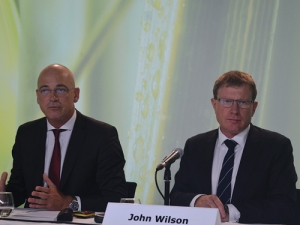Battle for milk
OPINION: Fonterra may be on the verge of selling its consumer business in New Zealand, but the co-operative is not keen on giving any ground to its competitors in the country.
 Fonterra chief executive Theo Spierings makes a point to journalists while chairman John Wilson looks on.
Fonterra chief executive Theo Spierings makes a point to journalists while chairman John Wilson looks on.
Fonterra chairman John Wilson says he is absolutely confident dairying will recover back to sustainable pricing levels for farmers.
However, he says the recovery is taking longer than everyone anticipated.
The key factor remains the extra milk coming out of Europe. But Wilson told Dairy News that there are signs Europe's milk growth is slowing. Fonterra has been talking to European dairy co-ops and agri analysts, Wilson says.
Over the last two years milk production has ramped up in the EU, backed by higher prices and new investment on farms.
According to Fonterra's latest global update, production in the EU in December increased 5% over the same month the previous year.
The EU has seen growth in milk production in each of the nine months following the removal of quotas on April 1, 2015. Production for the 12 months to December increased 2% compared to the same period the previous year, or an increase of 3.2 billion litres. Over this period Ireland was up 13%, Netherlands 7%, Poland 3% and the UK 2%.
The EU is also pumping most of the extra milk into export markets. EU exports increased 10% in November compared to the same month the previous year. Increases were seen in most of the major dairy categories with only SMP decreasing over the month. Exports have increased 7% for the 12 months to November, largely as a result of fluid and fresh dairy up 15%, whey powder and SMP up 9%, and infant formula up 7%.
But now it is becoming uneconomical for farmers in some regions. Some EU countries are introducing caps on stocking rates to minimise damage to the environment.
Wilson says Fonterra now supports analysts' view that Europe's milk production growth will slow to 1.5% compared to global demand rising by 2-3%. Demand for more milk will come from China, Asia and Africa.
"Once we reach a position where demand is greater than supply, prices will improve," Wilson says.
However, he is unable to suggest a timeframe. "We are still confident prices will rise but picking the exact time period is hard."
Wilson says other factors, such as US milk production and geo-political events, are also impacting milk prices.
According to Fonterra's global update, US production in January was in line with the same month last year. While the rate of milk production growth has continued to slow, for the 12 months to January it remains up 1% on the same period last year.
But most US milk is used in the burgeoning local market.
Keratin biomaterials company Keraplast and Wools of New Zealand have signed a new superpremium wool contract which is said to deliver a boost to wool growers.
While things are looking positive for the red meat sector in 2026, volatility in global trade remains a concern, says the Meat Industry Association (MIA).
The quest to find innovative practical, scientific solutions to deal with water-related issues at a catchment level has been the theme of an important conference at Massey University last week.
One of the country's top Māori farms faces a long and costly rebuild to get the property back to where it was before recent storms ripped through it.
The latest Global Dairy Trade auction results have delivered a boost to dairy farmers.
New Zealand potato growers are prioritising value creation from high yields to meet a complex mix of challenges and opportunities, says Potatoes NZ chief executive Kate Trufitt.
OPINION: Fonterra may be on the verge of selling its consumer business in New Zealand, but the co-operative is not…
OPINION: What does the birth rate in China have to do with stock trading? Just ask a2 Milk Company.